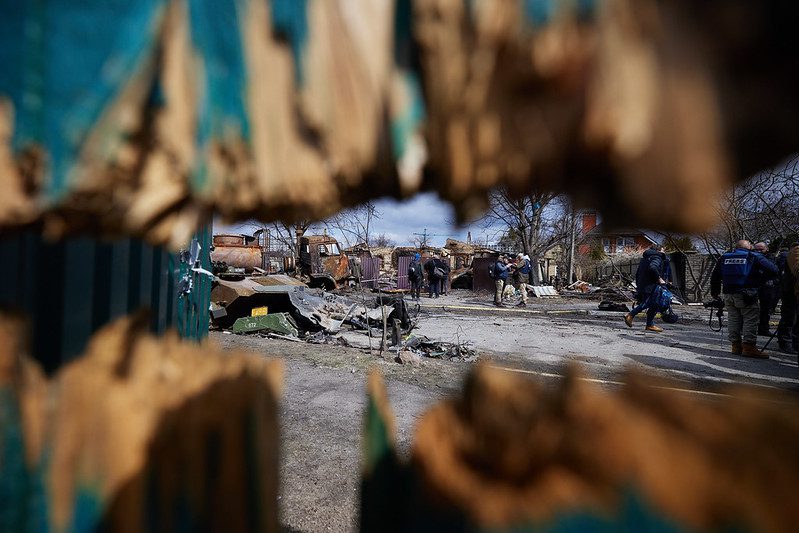In early April, dramatic photos of Bucza circulated around the world. Destroy the city’s infrastructure and kill civilians among its rubble. Estimated tragic death suffer minimum of 500 people.
Massacre in Bucza will take care The International Criminal Court in The Hague, which will investigate war crimes committed by Russia.
Manipulation, not censorship
As checked Portal Komupterswiat.pl, mascara photos in Bucza can be searched by Russians using Yandex – the most popular search engine in the country. Photos are not censored, as is the case for example in case photo from protest journalist Marina Owsiannikowa. While they don’t hide the facts, they are given deceptive comments.
The first search result shows false information. Users with Russian IPs can read that the photo shows an undercover actor or soldier wearing civilian clothes. Propaganda also claims that the photos show victims of the Nazis ruling Ukraine.
Bucza is like a hospital in Mariupol
According to Vladimir Putin massacre in Bucza this is another fake news. Russian trolls and bots try to convince Western society that the crimes in Bucza were a staging prepared by Ukraine (similar narrative accepted in the case of the hospital in Mariupol).
Allegedly, the footage and photos show Russians being killed or people pretending to be dead, and not Ukrainians living in the city. This is, of course, another element disinformation campaign.
Poland in the spotlight
The tragedy near Kiev was used by Russia to sow anxiety in Poland. EUvsDisinfo draw attentionthat, in addition to misinformation about the mascara itself, Russian trolls:
- sent e-mails containing threats to Polish decision-makers,
- massive spamming in the Polish media,
- tried to publicize on social media about the massacres in Volhynia during World War II.
The purpose of the action is clear: pro-Kremlin trolls are trying the negative attitude of the Polish people towards Ukraine.
Trolls try to intimidate Polish political class
Representatives of the Polish political class received emails from “Polish patriots” in which they were threatened with torture and brutal death. The news, among others, for the box Patrick What, Radoslaw Sikorski, Dariusz Matecki, Maciej Lasek, Krzysztof Mieszkowski and Elżbieta Zielińska. The list is certainly longer.
In addition to hate speech, the news is characterized by anti-Ukrainian messages. The e-mail contains a reference to the Ukrainian nationalist Stepan Bandera, who was responsible for the genocide of the Polish civilian population in Volhynia. References to Bandera serve to evoke associations between Ukraine and Nazism.
The fact that Elżbieta Zielińska received a message addressed in a male form attests to the mass nature of the attack.
I received this “unpleasant” email a while ago. Does anyone know where you can double-check someone by email? Is it possible at all? pic.twitter.com/5j59cO5J3G
– Elżbieta Zielińska (@elz_zielinska) April 4, 2022
Spam attack
One Polish news agency (name unknown) received an email from an account described as Russian, arguing that war crimes in Ukraine were committed by suspected Nazis against Russian soldiers.
Average Tuesday: this is the mailbox of one of the largest media agencies in Poland. Messages coming from “Russian citizens”, worrying about “Ukrainian killings”.
Not true. It was Russian soldiers who committed war crimes against Ukrainian citizens. There is no “peace for all” here. pic.twitter.com/ko7ibM6lIC– Kasia Chojecka (@chojecka_kasia) April 5, 2022
Messages are sent in English and Russian.
Wołyń back to wallpapers
In line with the content on mascara in Bucza, Twitter is showing increased activity around the subject of crime in Volhynia. This event was one of the most polarizing moments in Polish-Ukrainian relations. In 1943–1945 results of The ethnic cleansing carried out by Ukrainian nationalists killed about 100,000 people. Poland.

“Reader. Future teen idol. Falls down a lot. Amateur communicator. Incurable student.”


![Bogusław Wołoszański: “Achieving nuclear weapons would be the beginning of World War III” [WYWIAD]](https://storage.googleapis.com/bieszczady/rzeszow24/articles/image/877236c0-66fd-457a-9eb4-41792f9077ff)




